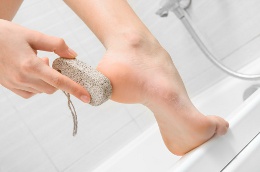For a number of people, cracked heels are a chronic problem. They often neglect the condition, but it is advisable to take care of the heel, for it bears the weight of the body. Know more on cracked heels pain, in the following write-up.

Cracked heels are a common foot problem. This condition is also known as 'heel fissures'. The most common cause of cracked heels is dry skin. The problem of cracked heels worsens around the rim of the heels. If the crack on the heels deepen, pain in the heels can become unbearable and standing on the feet or walking around can become very painful too. In some cases, there can be bleeding from these fissures and in severe cases, it can lead to infection too. The skin on cracked heels is often dry and has a thick callus, which is either yellow or dark brown in color. Now, let's go through some information on the causes and treatment of this condition.
Causes of Cracked Heels Pain
The most common symptom of this condition is pain, that is caused when the heels bear all the weight of the body. If in such a condition, the person wears open or thin soled shoes, the condition can aggravate. Now, let's see what are the causes of cracked heels.
- Some people have dry skin, which makes them vulnerable to cracks. Usually, such people have thickened dry skin, also known as callus, around their heels. This thickened dry skin tends to crack, due to increase in pressure in that area.
- Another reason for cracked heels is obesity. When a person is overweight, the skin on the heel tends to expand sideways. In such a case if the skin is dry, the pressure causes the skin to crack.
- If a person has to stand for a prolonged period of time, it causes excessive pressure on the pad under the skin. The condition worsens, if the person stands on hard floor. Hence, people who are prone to cracked heels, should avoid walking barefoot.
- If a person uses open backed shoes, it causes the fat under the heel to expand backwards and causes cracking of the skin, due to increased pressure.
- Skin conditions can also lead to cracked heels; conditions like psoriasis and eczema being the primary causes.
- There are a number of medical conditions, which can also cause cracked heels.
- In summers, this condition is caused due to loss of water from the skin. On the other hand, decrease of humidity leads to cracked heels in winters.
- Athletes foot, many a time, also leads to cracked heels. Many people are however, not aware of it.
- Heel spurs can also lead to dry skin and cracked heels. Flat feet as well as high arched feet can also be vulnerable to this condition.
- Excessive usage of hot water is also said to be a cause.
Treatment for Cracked Heels
If the cracked heel is caused due to athletes foot, you will need to mix emollient and an anti-fungal cream to treat the problem. It is very important to get rid of athletes foot, if you want the heel to cure. People, who wear open heeled shoes may want to consider using closed shoes, if they want to get rid of the problem. When the air is dry and less humid, it causes the skin to dry out all the more, worsening the problem. It is also recommended to use good shock absorbing shoes, which will prevent any further occurrences of cracked heels.
One of the home remedies for cracked heels is to apply petroleum jelly on the heels at night. But, before you apply the jelly, make sure you have washed your feet well. Apply a thick layer of petroleum jelly and wear socks before you go to bed. If you do not like petroleum jelly or are allergic to it, applying an oil based moisturizing cream twice daily can also help. I would recommend applying the cream once after bath and again before you go to bed at night. However, do not forget to wear socks. You may also use pumice stone, to reduce the thickness of the hard skin on the heels.
If the skin becomes very hard, do not try to remove it yourself with a razor or blade. Get it removed from a health care professional, to avoid the risk of infection.


 Cracked heels are a common foot problem. This condition is also known as 'heel fissures'. The most common cause of cracked heels is dry skin. The problem of cracked heels worsens around the rim of the heels. If the crack on the heels deepen, pain in the heels can become unbearable and standing on the feet or walking around can become very painful too. In some cases, there can be bleeding from these fissures and in severe cases, it can lead to infection too. The skin on cracked heels is often dry and has a thick callus, which is either yellow or dark brown in color. Now, let's go through some information on the causes and treatment of this condition.
Cracked heels are a common foot problem. This condition is also known as 'heel fissures'. The most common cause of cracked heels is dry skin. The problem of cracked heels worsens around the rim of the heels. If the crack on the heels deepen, pain in the heels can become unbearable and standing on the feet or walking around can become very painful too. In some cases, there can be bleeding from these fissures and in severe cases, it can lead to infection too. The skin on cracked heels is often dry and has a thick callus, which is either yellow or dark brown in color. Now, let's go through some information on the causes and treatment of this condition.